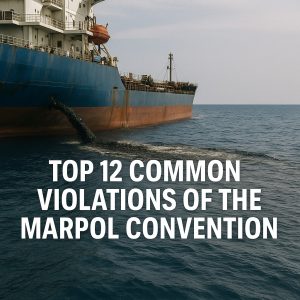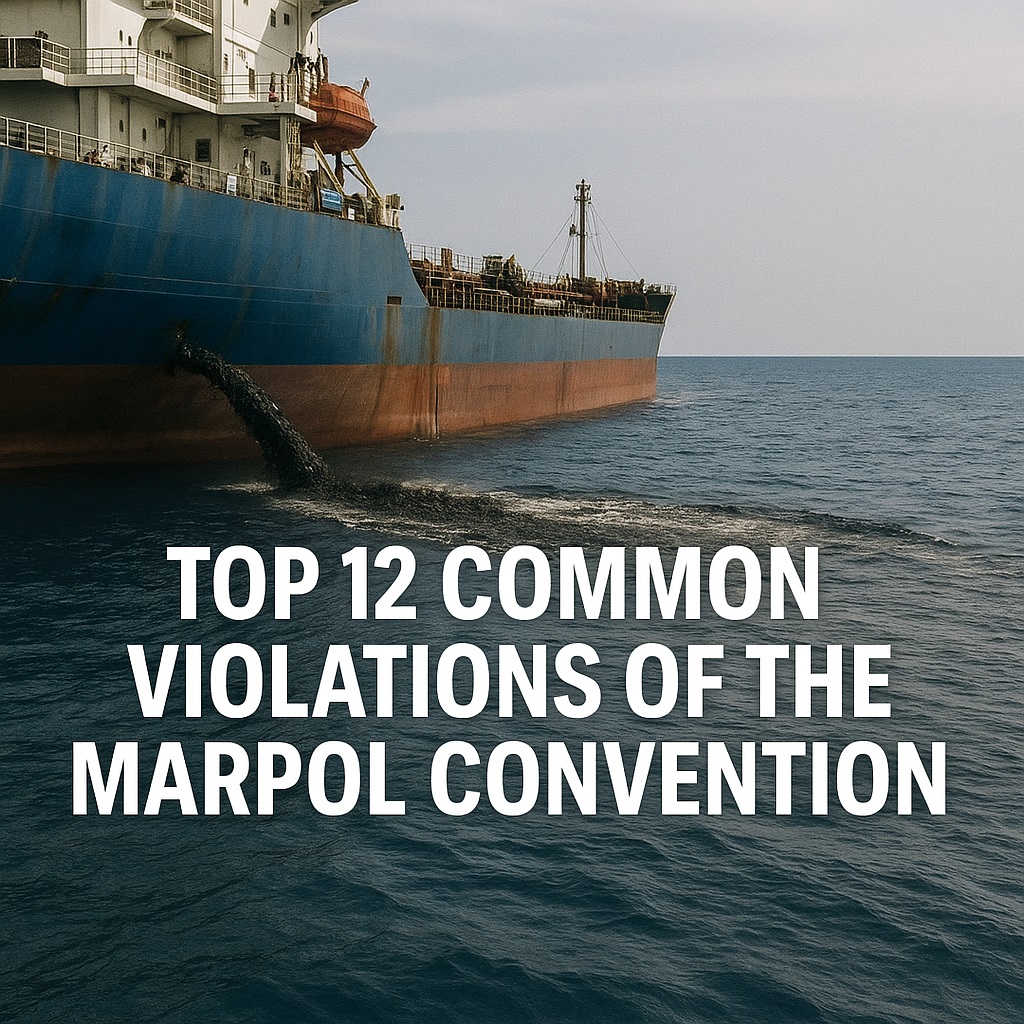
Discover the top 12 most common violations of the MARPOL Convention that threaten ocean health. Learn real-world cases, penalties, and preventive measures every seafarer and shipping company must know.
Why MARPOL Compliance Matters 🌊
The oceans cover more than 70% of our planet and serve as lifelines for global trade, biodiversity, and human well-being. Yet, shipping—responsible for moving over 80% of world trade (UNCTAD, 2023)—also carries environmental risks. To safeguard our seas, the International Maritime Organization (IMO) introduced the International Convention for the Prevention of Pollution from Ships (MARPOL) in 1973, later modified in 1978 and beyond.
MARPOL, with its six key annexes, covers pollution from oil, noxious liquid substances, harmful substances in packaged form, sewage, garbage, and air emissions. Despite being ratified by 150+ states covering ~99% of global shipping tonnage, violations remain widespread. From illegal oil discharges to air emission breaches, MARPOL violations are not only environmental crimes but also serious reputational and financial risks for companies.
In this article, we explore the 12 most common MARPOL violations, how they occur, and why they matter. Real-world cases, enforcement examples, and preventive measures bring the discussion to life—whether you are a maritime student, officer, or policy maker.
1. Illegal Oil Discharges (Annex I)
Oil pollution remains the most notorious MARPOL violation. Ships often discharge oily bilge water directly into the sea, bypassing their Oily Water Separator (OWS). Some crew even use “magic pipes” to illegally divert waste streams and avoid monitoring equipment.
📌 Case Example: In 2022, the U.S. Coast Guard fined a Greek tanker company $2.5 million for falsifying Oil Record Books and bypassing the OWS (US DOJ, 2022).
Why it matters: A single liter of oil can contaminate up to one million liters of seawater. Such discharges devastate marine life, fisheries, and coastal tourism.
2. Manipulating the Oil Record Book
Annex I requires accurate entries in the Oil Record Book (ORB). However, falsification is a chronic violation. Engineers may underreport discharges, omit incineration, or fake oil transfer logs.
Consequences:
-
Criminal charges against both the company and individuals.
-
Detention of the vessel under Port State Control (PSC) regimes (Paris MoU, Tokyo MoU).
-
Permanent reputational damage, with “name-and-shame” reports.
3. Sulphur Cap Non-Compliance (Annex VI)
The IMO 2020 Sulphur Cap reduced the global sulphur limit in fuel oil to 0.50% m/m (down from 3.5%). In Emission Control Areas (ECAs), the stricter limit is 0.10%. Despite this, some ships still burn high-sulphur fuel illegally.
Detection: Authorities now use drones, sniffers, and satellite surveillance to detect sulphur violations.
📌 Example: The Danish Maritime Authority uses aerial drones to sample ship exhaust plumes over the Great Belt, leading to multiple fines since 2021.
4. Nitrogen Oxide (NOx) Violations
Annex VI also limits NOx emissions from marine diesel engines. Violations occur when ships:
-
Disable or bypass Exhaust Gas Recirculation (EGR) or SCR systems.
-
Fail to maintain engine tuning to Tier II or Tier III standards.
Impact: Excess NOx contributes to acid rain and respiratory diseases in coastal populations.
5. Sewage Discharges (Annex IV)
Annex IV prohibits untreated sewage discharge within 12 nautical miles from shore. Yet, PSC reports show frequent violations: malfunctioning sewage treatment plants, overboard bypasses, and inadequate recordkeeping.
Why it matters: Sewage introduces pathogens, nitrogen, and phosphorus into coastal ecosystems, triggering algal blooms and health hazards.
6. Garbage Disposal at Sea (Annex V)
Throwing plastic and garbage overboard remains a stubborn violation—despite MARPOL’s strict prohibition on all forms of plastic discharge.
Real-world consequence: The IMO estimates that 80% of marine litter originates on land, but shipping is still a notable contributor. Floating plastics entangle marine mammals and enter the human food chain via microplastics.
7. Emission Reporting Manipulation
Under the IMO Data Collection System (DCS) and EU MRV (Monitoring, Reporting, Verification), ships must report fuel consumption and CO₂ emissions. Violations occur when:
-
Data is falsified to appear more efficient.
-
Fuel flow meters are tampered with.
-
Voyage reports omit certain legs.
Consequence: Non-compliance risks both regulatory fines and commercial penalties (e.g., charterers rejecting non-compliant ships).
8. Ballast Water Violations
Although ballast water falls under the BWM Convention (2017), it is often tied to MARPOL compliance. Many ships discharge untreated ballast, spreading invasive species like the zebra mussel or Asian green crab.
Case Study: In 2021, Transport Canada fined a bulk carrier $10,000 for failing to comply with ballast water exchange requirements.
9. Volatile Organic Compounds (VOCs) from Tankers
Annex VI also addresses VOC emissions during tanker loading. Violations occur when operators fail to use vapor recovery systems or vent VOCs improperly.
Impact: VOCs worsen air quality and contribute to ground-level ozone formation.
10. Incinerator Violations
Shipboard incinerators are tightly regulated. Violations include:
-
Burning prohibited substances (PVC, oily sludge with high chlorine).
-
Operating incinerators in ports or ECAs without authorization.
-
Lack of incinerator maintenance leading to incomplete combustion.
Result: Release of toxic dioxins, with long-term cancer risks.
11. Inadequate Garbage Record Book
Just like the ORB, the Garbage Record Book (GRB) is often falsified. Entries may be missing for plastics, incinerated materials, or offloaded waste. PSC inspectors often cross-check GRB entries with receipts from waste reception facilities.
12. Failure to Maintain Pollution-Prevention Equipment
Perhaps the most overlooked violation: poor maintenance. Oily Water Separators, sewage plants, incinerators, and scrubbers all require diligent upkeep. Ships cutting corners often face detentions during PSC inspections.
Example: A Paris MoU report (2022) revealed that pollution-prevention deficiencies accounted for 9% of all detentions in European ports.
–
Case Studies: MARPOL Violations in Action 🚨
-
Prestige Oil Spill (2002): Though primarily a casualty, investigations revealed poor compliance with MARPOL standards, leading to one of the worst oil spills in European history.
-
Magic Pipe Cases: Dozens of cases across the U.S., Singapore, and Europe reveal crew whistleblowing as a primary source of detection.
-
IMO Sulphur Cap Enforcement (2020–2023): Paris MoU statistics show nearly 5% of inspected ships had sulphur-related deficiencies in the first year of enforcement.
Why These Violations Happen
MARPOL violations often stem from intense commercial pressure to save time and money by avoiding proper waste disposal. This is compounded by significant crew training gaps, where junior seafarers lack sufficient education on environmental regulations. Weak oversight from certain flag states with limited enforcement capacity creates an opportunity, while the high cost of compliant fuel or disposal fees provides a constant temptation to cut corners.
- Commercial Pressure: Saving time and cost by avoiding proper waste disposal.
- Crew Training Gaps: Lack of MARPOL education among junior seafarers.
- Weak Oversight: Flag states with limited enforcement capacity.
- Temptation to Cut Corners: High costs of compliant fuel or disposal fees.
Solutions and Preventive Measures
A multi-faceted approach is required to prevent violations. This includes adopting digital monitoring through remote sensing and real-time data tracking, alongside enhanced crew training using IMO Model Courses. Stronger enforcement can be achieved through robust Port State Control inspections and whistleblower incentive programs, such as those that reward reporters with a portion of the resulting fine. Ultimately, the wider adoption of cleaner technologies like scrubbers, LNG, and methanol also reduces the economic incentive for non-compliance.
- Digital Monitoring: Remote sensing, real-time data tracking.
- Crew Training: IMO Model Courses on environmental protection.
- Whistleblower Incentives: U.S. law rewards whistleblowers with part of the fine.
- Robust PSC: Paris MoU & Tokyo MoU joint concentrated inspection campaigns (CICs).
- Cleaner Technologies: Scrubbers, LNG, methanol, biofuels.
Frequently Asked Questions (FAQ)
1. What happens if a ship violates MARPOL?
Penalties range from heavy fines and vessel detention to imprisonment of responsible crew.
2. Who enforces MARPOL?
Primarily flag states and port states through Port State Control inspections.
3. How are violations detected?
Through PSC inspections, satellite surveillance, drones, whistleblower reports, and monitoring systems.
4. Can individuals be punished, or only companies?
Both. Engineers and masters have faced jail terms in addition to company fines.
5. Is compliance costly?
Yes, but non-compliance is costlier in the long run due to fines, reputational damage, and environmental liability.
6. Are developing countries strict on MARPOL?
Enforcement varies. Regions under the Paris MoU and Tokyo MoU are stricter than others.
7. How can cadets and junior officers learn MARPOL compliance?
Through IMO Model Courses, e-learning, and simulator training in maritime academies.
Conclusion: A Shared Responsibility 🌍
The 12 common MARPOL violations remind us that laws alone cannot save the oceans. Compliance is a matter of integrity, training, and awareness. Every seafarer—from cadet to captain—plays a role in protecting our seas for future generations.
Shipping is the engine of global trade, but it must also become the guardian of global oceans. As new challenges arise—climate change, decarbonization, microplastics—the spirit of MARPOL remains essential: prevention is better than cure.

